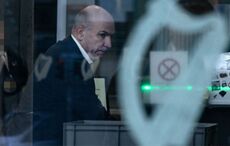For a young Corkman life is nearly always sad these days.
Shane O'Leary, who has been living in New York for five years, wakes up every morning thinking of his sister back home.
His sister Catherine, a beautiful 31-year-old mother of one, was diagnosed with what doctors call Locked In Syndrome in February.
Shane, 33, when not bartending at the Mean Fiddler in Times Square, spends his time trying to figure out ways to raise money in a heartfelt effort to bring his beloved sister to the U.S. so "she can get the best treatment in the world," he told the Irish Voice recently during an interview about his sister's condition.
The young Cork woman's sad story began when she was 28.
Catherine, who worked in a Subway sandwich bar in Cork, got a dose of the hiccups. Not unusual, but when they wouldn't go away she got worried.
"She found it very difficult to catch her breath and just couldn't stop hiccupping," recalls Shane, who grew up in Ballincollig, on the outskirts of the city, with Catherine and three other siblings.
Her hiccups lasted three years.
She visited countless doctors to try and determine what was wrong with her. They said it must be an ulcer.
It wasn't an ulcer. The hiccups continued, causing excruciating headaches and vomiting spells.
Catherine found it harder and harder to swallow food. She lost weight, finally dropping from a healthy 133 pounds to a mere 84 pounds.
Doctors said she was anorexic."I'm not," she told them.
"Then you must be bulimic," they said. "Not that either," she said.
"Well then it must be depression that is causing all this," they finally decided.
Shane is furious at the doctors. "One doctor said it was all in her head, and although he didn't mean the tumor, her sickness was in her head," said O'Leary.
It was finally Catherine herself who had to beg the doctors in Cork to give her an MRI brain scan. They finally agreed.
Catherine's seven year old son Brandon, who made his Communion without his mother being present, kept asking his dad and Catherine's partner Nigel Herlihy why his mother was going into hospital for hiccups. "Brandon just couldn't understand why his mother was so sick from hiccups," said Shane.
"Catherine worked right up to the week before she was going for brain surgery. Can you believe that? She is just so strong."
Shane recalls the horror they went through the weekend in January when Catherine had the scan. "The MRI was on the Friday and by this stage Catherine had started losing feeling in her fingers," he said.
"On Monday, when the results were in the doctors couldn't even look at us straight."
Doctors discovered it was a tumor the size of a golf ball that was causing Catherine's repetitious hiccups.
Two weeks after the discovery Catherine was scheduled for "high risk" brain surgery. Doctor's gave her a 15 percent chance of survival.
The night before her surgery, the anesthetists and neurologist spoke to her about the dangers of the long operation.
"Have you any questions?" they asked.She said, "No."
They said, "Are you frightened?" She said, "No, I just want to get this out of me and let me eat again."
She wasn't one bit frightened, remembers O'Leary. "See you in recovery," were the last words Catherine has ever spoken.
The operation lasted 15 hours. During the procedure Catherine suffered two massive strokes.
"It was these strokes that left her paralyzed from the neck down," O'Leary said.
Doctors call it Locked In Syndrome. It's rare in Ireland.
The medical term is Cerebromedullospinal Disconnection. Catherine's condition means she is awake and alert but cannot move or communicate due to complete paralysis of nearly all her voluntary muscles in her body.
At first, all Catherine could do was blink.
She blinked for everything. One blink for yes, two blinks for no and so on.
Her family quickly learned the meaning of her blinks.
Catherine has now been in hospital for eight months. In that time, she has slowly recovered the ability to nod and even smile and she is beginning to form shapes with her mouth that create words.
However, she can't speak. "She has a tracheotomy in her throat so she can breathe," explained Shane.
Although O'Leary and his family are hoping that Catherine will recover as much as possible, doctors have told them it is unlikely she will ever walk again.
During her time in hospital Catherine has died, but doctors have brought her back. "Just four weeks ago there wasn't sufficient suction in her tract so it stopped her from breathing," Shane added.
A couple of weeks ago Catherine, whose father Pat has practically given up work to be by his daughter's side all day, had her first shower since her operation.
"She also has a special chair so the family wheel her outside for some fresh air," said O'Leary, happy that his sister is beginning to experience some sort of civilization again.
Shane, who went home in January when he discovered how sick his sister was, spent four months by her side, and as he saw her slowly progressing he returned to his life in New York. "I didn't realize when I was coming back how hard it would be here," he said.
Shane's blue eyes sparkle when he describes his sister's personality.
"She is just wonderful," he said. "She is fun, hard working, a real spirited person and very family orientated. You should see her with Brandon. They are so close."
It's her love for her family, Brandon and Herlihy, that O'Leary feels is pushing his younger sister to get better. "She is such a fighter," he says with sad eyes.
After her family fought tooth and nail for proper after care Catherine, who also suffers from short term memory loss, has been accepted into the National Rehabilitation Hospital in Dun Laoghaire, Co. Dublin which was due to start on September 30.
However, the date was pushed back by a few months so on Tuesday, September 9, Catherine was airlifted from Cork University Hospital to a rehabilitation center in London where she will spend two or three months before starting in Dublin. "We are hoping that this will help her get back on track," Shane said.
Although satisfied for the time being that his sister will spend the next few months in a good rehabilitation center in London, he feels she will only receive the best treatment here in the U.S. at the UPMC Institute for Rehabilitation and Research in Pennsylvania.
"After talking to an American neurosurgeon here I have been advised that bringing Catherine to the U.S. for her recovery is by far the best option simply because the care is top class here," said Shane.
The only obstacle standing in the way of bringing Catherine to the U.S. for recovery and leaving her in Ireland is money. "It's going to cost in the region of $250,000 for this center," said Shane.
Proud of his Irish community and friends here in New York, he added, "The Irish people here are just great and my friends, I'd be seriously lost without them."
It's these friends that have rolled up their sleeves and helped Shane organize several fundraisers to help get his sister to the U.S.
"We are still a long way off but people are great, so I have full faith that we will raise the money no matter what it takes," he said.
Donations can be made to the Catherine O'Leary Fund, Permanent TSB, North Main Street, Cork. Account: 12536790 Sort Code: 99-07-07, or at www.catherineoleary.com.




Comments